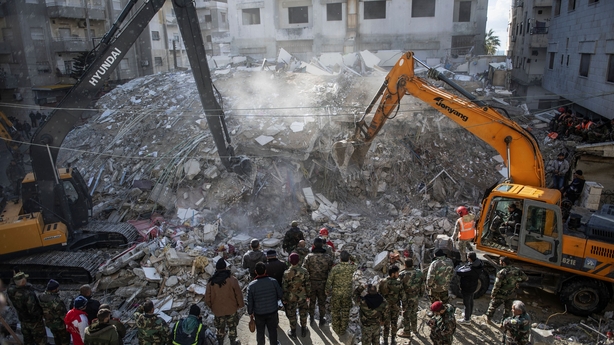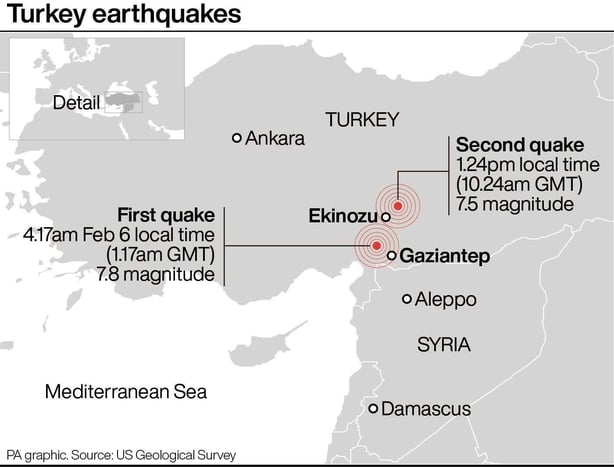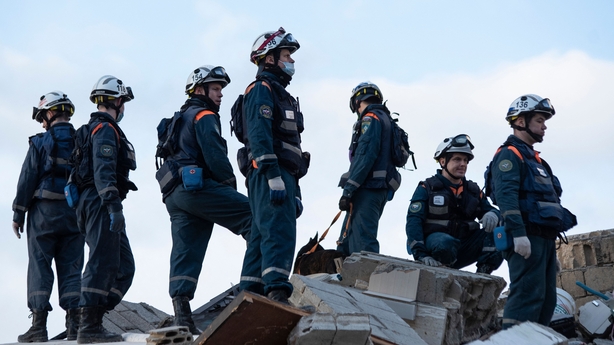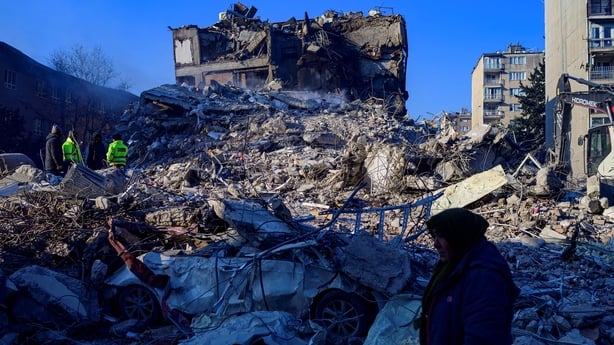A senior World Health Organization official bemoaned Syria's "forgotten crisis" today, as aid began trickling into rebel-held areas, days after a devastating earthquake.
As the WHO prepared to fly medical supplies to Syria from Dubai, Mike Ryan, executive director of the WHO's Health Emergencies Programme, said a huge backlog of aid was waiting to reach Syria's rebel-held northwest.
The single aid corridor bypassing government-controlled areas and servicing the war-shattered region, which is home to four million people, was temporarily cut off by Monday's massive quake.
The first convoy of emergency supplies finally passed through the Bab al-Hawa border crossing from Turkey yesterday. More than 22,000 people have died in the disaster in both countries.
"The world's forgotten about Syria," Mr Ryan told reporters in Dubai, during preparations for the aid flight.
"Frankly, the earthquake's brought attention back. But those millions of people in Syria have been struggling now for years. That's become a forgotten crisis."
UN chief Antonio Guterres urged the Security Council yesterday to authorise the opening of additional crossings on the Turkey-Syria border for the delivery of UN aid to rebel areas.
This week, WHO chief Tedros Adhanom Ghebreyesus warned of a "race against time" to save lives in the quake zone as aftershocks continue and freezing winter conditions bite.
Even before the earthquake, a decade of civil war and Syrian-Russian aerial bombardment had destroyed hospitals and prompted electricity, fuel and water shortages in the rebel-held northwest.
"There's a huge backlog of supplies ready to go," Mr Ryan said. "Many agencies, including our own had pre-stocked because we're into the winter, they're already very exposed.
"There's a huge problem with millions of people."
The chances of finding survivors had dimmed before the first aid arrived, after the end of the three-day period that experts consider critical to save lives.
Syria is now facing a "secondary disaster" of lives lost due to a lack of medical supplies, Mr Ryan warned.
"We have to recognise the scale of this disaster is so large, it's overwhelming everyone's capacity," he said.
"If they don't have equipment, they can't do their job - it's like asking a fireman to rush to a fire without a fire hose."
Officials and medics said 18,991 people had died in Turkey and 3,377 in Syria in Monday's quake, bringing the confirmed total to 22,368. Experts fear the number will continue to rise.
Quake-hit Syrian city buries its dead on farmland
In Syria's coastal city of Jableh, Mohammed Daya has turned his farmland into a makeshift graveyard, with cemeteries overwhelmed as more bodies are pulled from the rubble.
The 7.8-magnitude quake struck near the Turkish city of Gaziantep, about 40km from the Syrian border.
"We could not help the living, but at least we should honour the dead," Daya said from his farm-turned-cemetery, where dozens of people were hard at work digging graves in fields where tomatoes and peppers once grew.

The 47-year-old said he gave away most of his farmland, which he had planned to sell later for construction, so the dead could be laid to rest.
Sixteen bodies were already buried in the field and he said he was ready to give away more land if needed.
"I never expected this land would one day become a cemetery," he said.
Read more: Aid agency WFP running out of stock for quake survivors
Relatives of those who lost their lives wrote the names of the dead by hand on nearby cement blocks used as makeshift tombstones.
Obituaries were plastered everywhere on the walls of the city.

'Death has come again'
Jableh is located in mostly government-controlled Latakia, a province that is one of the war-ravaged country's worst impacted by the tremor.
The earthquake killed more than 500 people and destroyed 100 buildings in the province alone, authorities said.
But there is little hope that rescuers, who have already scoured 60% of affected sites in the province, will find anyone alive under the flattened buildings.
Experts say more than 90% of survivors are rescued within the first three days of emergency operations after an earthquake, on average.
Near the makeshift cemetery, many have been sleeping outside in the cold and toiling alongside rescuers with their bare hands, pots and pans to sift through the debris in hopes of finding their loved ones - dead or alive.
In the neighbourhood of Rihawi, dozens of families anxiously waited for news of relatives still trapped under a crumbled structure, as bulldozers lifted concrete slabs.
Standing in the middle of the destruction, Adam Shaabo waited for a family member to be pulled out.
"I can't forget their faces," he said, recalling their lifeless, crushed bodies.
Jableh has been relatively spared the worst of Syria's almost 12-year civil war, but it has witnessed violent attacks and its residents have been killed in action, mostly alongside government forces.
"We thought we had bid farewell to big funerals," he said, "but death has come to Jableh again."

'Dying breath'
Syrian first responders, as well as rescuers from Lebanon and Russia, have been rummaging in the rubble in a losing race against time.
Moscow is one of Damascus' main allies, and has two military bases in Syria: the airport in Hmeimim 5km from Jableh; and the naval port of Tartus, roughly 60km to the south.
Lebanese rescuers pulled out a corpse from under slabs of concrete as relatives dashed to them, crying out as they recognised a deceased loved one.
"We are using primitive methods; we yell out for any survivors and wait for a response," said one of the Lebanese, Ali Safieddine.
"The building crumbled like a biscuit."
In one neighbourhood, residents took shifts guarding abandoned, damaged buildings, while others were busy distributing bread to shelters.

Nearby, rescuer Jalal Daoud dug in the wreckage hoping to catch survivors in their "very last hours", he said.
"We are trying to work quickly... to catch the living before their last dying breath."
The White Helmets rescue group that operates in rebel-held areas had expressed disappointment at the first batch of aid, saying it was part of "routine" deliveries.
"This is certainly not special aid and equipment for search and rescue teams," the group said on Twitter.
"This makes us very disappointed at a time when we are desperate for such equipment to help us save lives from under the rubble."

